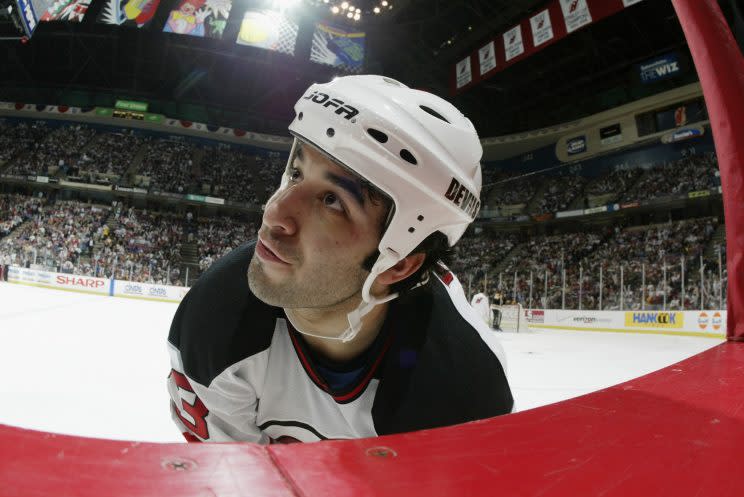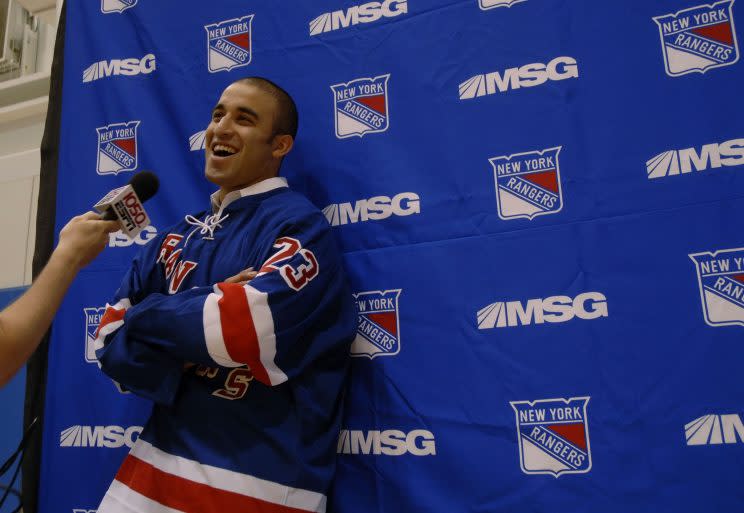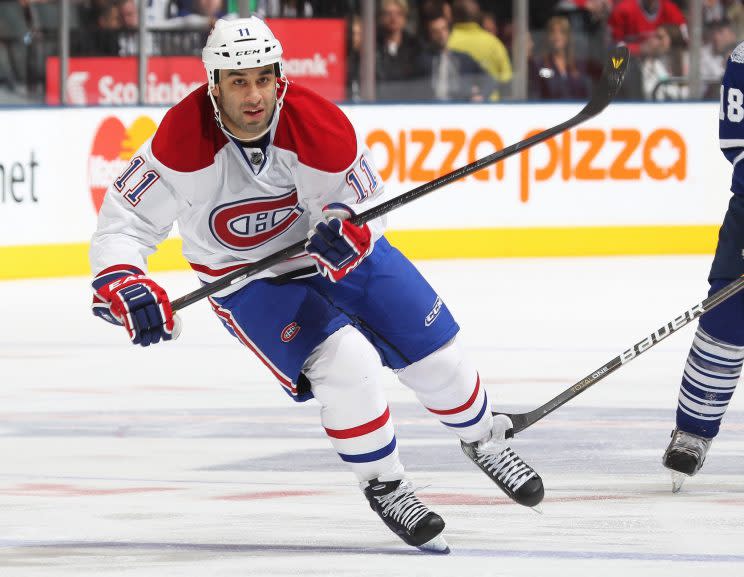Love and hate (and eventual love again) of Scott Gomez

As a New Jersey Devils fan, I loved Scott Gomez.
They took him No. 27 overall in the 1998 NHL Draft, right behind Mike Van Ryn, who grabbed headlines as the next sturdy model off the Devils’ assembly (blue) line.
Gomez had met Lou Lamoriello one year earlier, when the U.S. junior national team was touring the country. As legend has it, Gomez actually wrote his name at the bottom of the Devils’ depth chart in their dressing room when Lamoriello wasn’t looking, and then asked the cantankerous general manager why he had slipped so far down the team rankings.
A ball-breaker, even before he was drafted. No wonder Lou took a shine to him.
His draft selection was notable for three reasons: First, that the Devils traded to get him, swapping picks with the Dallas Stars to snag the No. 27 pick; that he was raised in Anchorage, Alaska; and that his father’s family had once been deported to Mexico for having illegally entered the United States, living in California.
Carlos Gomez, his father, was born in Modesto and eventually grew up in San Diego. Carlos moved to Alaska in 1972 to work in construction. That’s where he met Dalia, an ironworker, whom he married. Their son, Scott, became enamored with hockey after going to a University of Alaska game as a four-year-old. His family couldn’t afford gear, so he used loaner equipment from a local Boys and Girls Club in order to learn hockey. Eventually, he thrived at it.
[Yahoo Sports Fantasy Hockey: Sign up and join a league today!]
When he became the only first-generation Mexican-American to play in the NHL, that was an accomplishment in itself, even if it became a point obsession for the media. According to author Mark Stewart in “Scott Gomez: Open Up The Ice,” reporters went as far as calling him “hockey’s Jackie Robinson,” which Gomez scoffed at. “Sometimes they make it sound like I crossed the border two years ago with a bottle of tequila and a pair of skates,” said Gomez.
To change the narrative, he went and had the greatest rookie season for a forward in Devils history: 19 goals and 51 assists in 1999-2000.
(“I don’t consider myself more of an assist guy than a goal guy,” Gomez said as a rookie. File that one away…)
It was a better freshman year than Brendan Shanahan, Kirk Muller, Patrik Elias or Zach Parise. Remarkably, he did it as a second-line center behind Jason Arnott’s A-Line. He secured 49 first-place votes for the Calder Trophy out of 58. Which was a nice cherry on top after winning the Stanley Cup with the Devils in 2000.
Simply put, he was arguably the most potent and creative offensive player the Devils ever developed. His chemistry with players like Claude Lemieux, Alex Mogilny and Brian Gionta – helping him to 48 goals in 2005-06, a season that saw Gomez scored 33 goals himself – was palpable. His charisma was off-the-charts, to the point where one legitimately wonders how intensely his star would have glowed were it not stuck in the black hole of personality that was a Lamoriello team. But hey, at least he had that cameo on “One Life To Live.”
It wasn’t always the smoothest ride. There was the offensive inconsistency, sometimes born out of Gomez being played out of position, but notable in runs like the 2003 Stanley Cup. And there was the contract dispute. The first one. Not that other one, before unrestricted free agency in 2007.
***
As a New Jersey Devils fan, I hated Scott Gomez.
For 51.5 million reasons.

To reset the scene on July 1, 2007: The New Jersey Devils were still licking their wounds from Scott Niedermayer bolting for the Mighty Ducks of Anaheim in 2005. Their new building in Newark was on the verge of opening. It appeared Brian Rafalski, Niedermayer’s heir, was going to leave for Detroit. And it appeared that Scott Gomez was going to leave too, even if the Devils were going to ante up with a significant offer to keep him.
Which was, of course, his right, and what happens in a capped league.
But then he chose the Rangers.
For seven years and $51.1 million.
Dead. To. Me.
Gomez signed the same day that the Buffalo Sabres lost Chris Drury to the Rangers for $35.25 million over five years, the kind of sinister economic conquest usually reserved for the Steinbrenner Yankees. It crushed me as a Devils fan. Not only because of the continuing relegation of the Devils to little brother status to the Rangers – despite the parking lot Cup parades – but because it was the [expletive] Rangers.
To put it in more general terms: Imagine Jay-Z divorcing Beyonce and then shacking up with Becky With The Good Hair. (The Devils, in my completely unbiased opinion, are Beyonce in this scenario.)
So it was with more than a little malicious glee that I watched Gomez stumble through two disastrous seasons with the Rangers.
Not on the score sheet, mind you. Gomez had 128 points in 158 games with the Rangers, and managed a higher points per game average (0.81) than he had with any other team in the NHL. He had 25 points in 21 playoff games with the Rangers.
Alas, they only won one playoff round in two years (against the Devils, no less), and Gomez suffered through what we’ve come to call, oddly enough, Chris Drury Disease: a perfectly acceptable performance under different circumstances becomes a catastrophe when compared to the unreal expectations of his contract value.
The Hockey Rodent, a Rangers blogger, wrote: “He appeared to be going through the motions. His personality was too easy-going. If ever I’d characterize someone as a mercenary, it was Gomez, who never behaved as a warrior in MSG.”
Larry Brooks of the NY Post wrote: “His game had deteriorated beyond repair. He surely was one of the players Tortorella had in mind when citing a handful of Rangers as being out of condition. His game was gone, his smile was gone, and he was going.”
It was perhaps the most poetic of justices that Gomez, signed as a giant middle finger to the salary cap by the Rangers, became a cap casualty just two years later.
Yet his entire legacy on Broadway was wiped from the chalkboard by the giant, blockheaded eraser known as Bob Gainey, general manager of the Montreal Canadiens.
What’s amazing about what’s now known as the Ryan McDonagh Trade was that the Canadiens trading away an eventual Top 10 defenseman wasn’t the biggest outrage at the time; it was that they acquired Scott Gomez, who still had five years and more than $30 million left on his contract, and had just shown the hockey world that he couldn’t handle the burden of his contract and No. 1 center status on an Original Six team.
Seeing Scott Gomez go to the Montreal Canadiens was like watching the Wackowskis directed JUPITER ASCENDING: Years of goodwill already having been squandered, the stench of pending big-budget disaster was unavoidable.
And that’s what you get for dabbling in the dark arts of New York Rangers free-agent acquisition, Mr. Gomez!
***
As a New Jersey Devils fan, I loved Scott Gomez.
I’ll tell you why: Because you don’t really appreciate a player until you see how he reacts in the darkest hour.

I’m not talking about after an overtime loss or a playoff elimination. That’s [expletive] you can sneakily blame on someone else, even if you claim the defeat as your own.
No, I’m talking about when you’ve gone more than a year without scoring a goal. When you become an international punchline for that lack of goal-scoring. When Hal Gill has scored more goals than you in a one-year span … and you’re a center.
From Feb. 5, 2011 to Feb. 10, 2012, Scott Gomez didn’t score a goal. As Travis Hughes wrote, “he’s not the first player to go an entire calendar year without scoring a goal and he won’t be the last, but he’s certainly the first $7.35 million player to do so.”
And thus bars were offering free booze if he scored. And thus websites like “Did Gomez Score Last Night?” were born.
But in the grand tradition of Roberto “My Contract Sucks” Luongo, Gomez’s lighthearted ability to deal with this absurd display of offensive ineffectiveness endeared him to us. Like when #LastTimeGomezScored trended and someone wrote that “#LastTimeGomezScored I would rent DVD’s at Blockbuster.”
Gomez laughed when he heard the line.
“If you can’t laugh about yourself,” Gomez said, “then you’re an (expletive).”
Indeed.
After the inevitable buyout of his contract, we had more enlightenment. The nomadic last years of Gomez’s hockey career were, perhaps, some of his happiest. “It’s a life’s lesson. It’s not about ego. Are you kidding, you play pro hockey. It’s another challenge,” he said.
So the PTO with the Sharks became a contract, which earned him another with the Florida Panthers, which earned him another with the New Jersey Devils (a reunion, against all odds), which earned him two more with the St. Louis Blues and Ottawa Senators.
“His passion and love for the game is still there,” said Panthers GM Dale Tallon in 2013. “We’re going to be a young team down the road with tremendous depth at all positions, and we need to surround them with champions.”
Scott Gomez was a champion. He was a rookie sensation. He was a borderline offensive star. He was a free-agent prize, and then a big contract pariah. He was the centerpiece of one of the most lopsided trades in NHL history. He once went a calendar year without scoring a goal. He was a Devil, a Ranger, a Canadien, a Shark, a Panther, a Blue and a Senator, before he was no longer and NHL player.
Sixteen years after he made NHL history just by being Carlos Gomez’s son, Scott Gomez retires having lived a career far beyond what the kid from Anchorage, skating in borrowed hockey gear, probably imagined for himself. And us, for him.
—
Greg Wyshynski is a writer for Yahoo Sports. Contact him at puckdaddyblog@yahoo.com or find him on Twitter. His book, TAKE YOUR EYE OFF THE PUCK, is available on Amazon and wherever books are sold.



